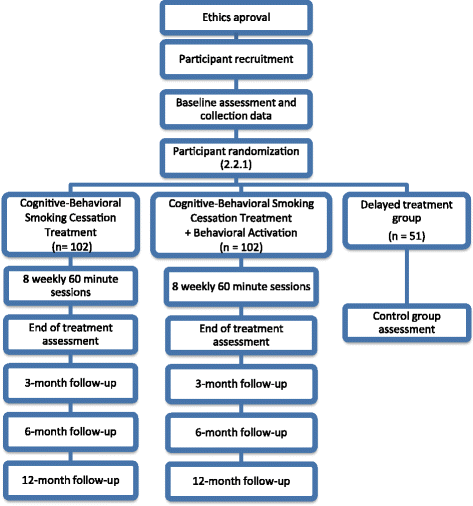Cognitive-behavioral treatment with behavioral activation for smokers with depressive symptomatology: study protocol of a randomized controlled trial
- PMID: 28390417
- PMCID: PMC5385057
- DOI: 10.1186/s12888-017-1301-7
Cognitive-behavioral treatment with behavioral activation for smokers with depressive symptomatology: study protocol of a randomized controlled trial
Abstract
Background: Smoking is an important risk factor for mental health-related problems. Numerous studies have supported a bi-directional association between cigarette smoking and depression. Despite the advances in understanding the comorbidity between both problems, the most effective psychological treatment that simultaneously targets smoking and depressive symptomatology remains unclear. The objective of this study is to assess the effectiveness of a cognitive-behavioral intervention for smoking cessation with components of behavioral activation for managing depressed mood.
Method: A single blind, three-arm, superiority randomized controlled trial is proposed. Participants will be smokers over 18 years old, who smoke at least 8 cigarettes per day. Participants will be randomized to one of three conditions, using a 2:2:1 allocation ratio: 1) standard cognitive-behavioral smoking cessation treatment; 2) standard cognitive-behavioral smoking cessation treatment plus behavioral activation; or 3) a three-month delayed treatment control group. The primary outcome measures will be biochemically verified point-prevalence abstinence (carbon monoxide in expired air) and significant change from baseline in depressive symptoms to the end of treatment, and at the 3-, 6-, and 12-month follow-up.
Discussion: This study aims to assess the efficacy of a cognitive-behavioral intervention with behavioral activation components for smoking cessation and depressive symptoms, compared to a standard cognitive-behavioral intervention to quit smoking. As the relation between depressive symptoms, even at subclinical levels, and quitting smoking difficulties is well known, we expect that such intervention will allow obtaining higher abstinence rates, lower relapse rates, and mood improvement.
Trial registration: ClinicalTrials.gov : NCT02844595 . Retrospectively registered 19th July, 2016. The study started in January 2016, and the recruitment is ongoing.
Keywords: Behavioral activation; Depressive symptoms; Randomized controlled trial; Smoking cessation.
References
-
- U. S. Department of Health and Human Services, Public Health Services O of the SG. The Health Consequences of Smoking—50 Years of Progress: A Report of the Surgeon General, 2014. Rockville; 2014.
-
- Organization WH . Depression [internet] World Health Organization: WHO Press; 2016.
-
- Leventhal AM, Japuntich SJ, Piper ME, Jorenby DE, Schlam TR, Baker TB. Isolating the role of psychological dysfunction in smoking cessation: relations of personality and psychopathology to attaining cessation milestones. Psychol Addict Behav. 2012;26(4):838–849. doi: 10.1037/a0028449. - DOI - PMC - PubMed
-
- Weinberger AH, Pilver CE, Desai RA, Mazure CM, McKee SA. The relationship of dysthymia, minor depression, and gender to changes in smoking for current and former smokers: longitudinal evaluation in the U.S. population. Drug Alcohol Depend. 2013;127(1–3):170–176. doi: 10.1016/j.drugalcdep.2012.06.028. - DOI - PMC - PubMed
Publication types
MeSH terms
Associated data
LinkOut - more resources
Full Text Sources
Other Literature Sources
Medical
Research Materials


